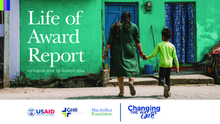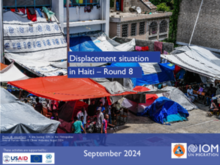childrens_living_arrangement
children_living_without_bio
Displaying 1 - 10 of 104
This news article describes how an Irish missionary, orphanage staff, and a 3-year-old child were released after being held captive for nearly a month following a gang abduction in Kenscoff, a suburb of Port-au-Prince, Haiti.
The Archdiocese of Port-au-Prince said the kidnapping of eight people from the Sainte-Hélène orphanage betrayed ‘the failure of the state and of a society that is losing its sensitivity to life’.
Parenting author Kayla Craig; Lauren Pinkston, Kindred Exchange; Kristin Langrehr, 111Project; and Stephanie Robinson, Faith to Action, share their own experiences of caring for orphans and adoption. Their reflections provide realistic ways to be involved in supporting orphaned and vulnerable children.
The Changing the Way We Care℠ (CTWWC) Life of the Award Report highlights the initiative’s global efforts to promote safe, nurturing family care for children. Since 2018, CTWWC has been driving care reform in countries like Guatemala, Kenya, and Moldova, while supporting smaller projects in Haiti and India.
This IOM report reveals that there are more than 700,000 people currently displaced within Haiti, 52% of whom are children. Haiti is experiencing an unprecedented crisis that has affected the entire population, including the many orphanages operating there.
Human rights organizations urge the Dominican Republic to respect treaties and conventions on the deportation of minors, highlighting the severe risks faced by children deported without their parents.
After months of languishing in an abusive boarding school in Jamaica — where boys said they were beaten, waterboarded, starved and whipped — Michigan teenager Elijah Goldman begged to come home.
The Better Together conference will provide a dedicated space and time to convene, share, and learn over two and half days in Nashville. Workshops will be focused on topics related to supporting children in families with special emphasis on the complexity of the current context in Haiti. In addition to workshops, there will be plenty of time dedicated to connecting and growing relationships.
A recent UNICEF report reveals that 30 to 50 percent of Haïti’s armed group members are children, coerced into service by persistent social, economic, and political instability. The escalating armed violence in the country has created a dire situation, particularly for the nation’s children, the United Nations International Children organization said.
Since the coordinated attacks operated by armed groups in late February, UNICEF and its partners have rapidly scaled up their efforts, reaching over 50,000 displaced children and families impacted by the resurgence of violence in various parts of


